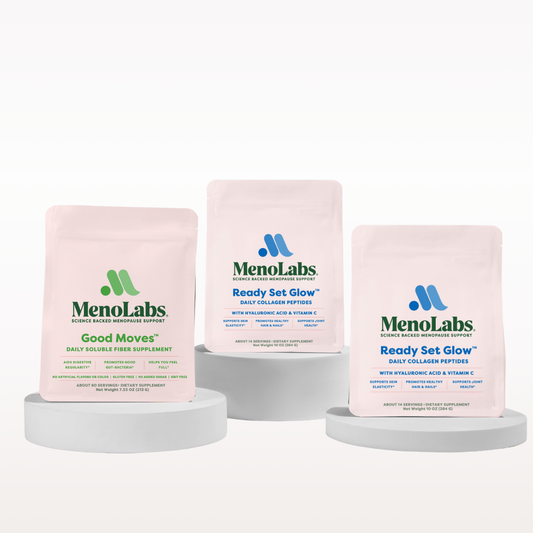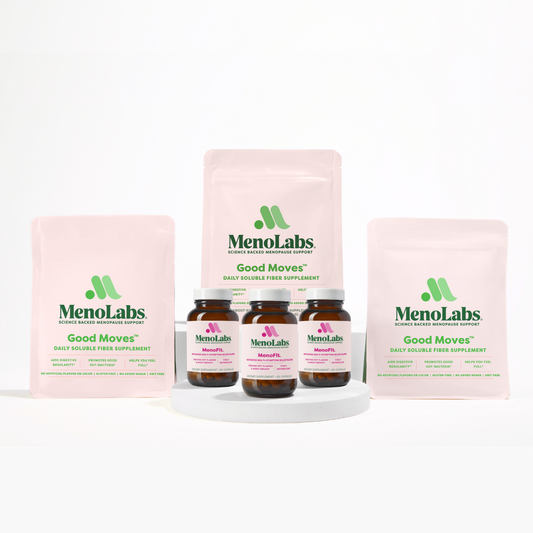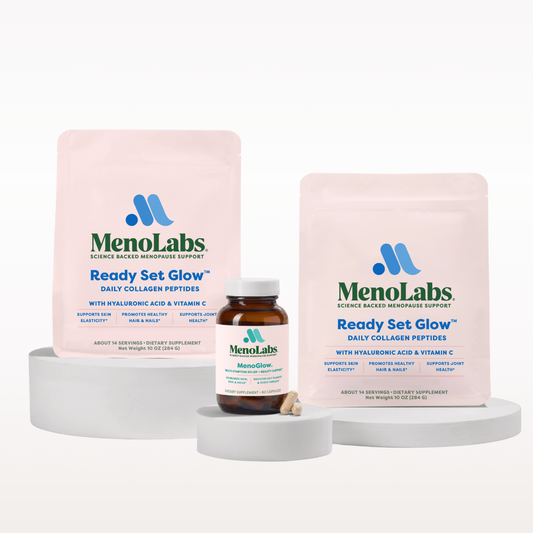The summer months can be brutal for women dealing with perimenopause and menopause. The hot weather makes it easier for body temperature to rise, leading to hot flashes and/or night sweats, which can in turn lead to disrupted sleep. It’s also the time of year when we’re most susceptible to dehydration and its symptoms that worsen with menopause. Whether you’re dealing with one of these symptoms or all of them at once, you can end up feeling exhausted and struggling to make it through the days.
That’s not how anyone wants to spend the summer. But having peri/menopause symptoms doesn’t mean summer fun is off the table — you can keep your energy up by supporting your body with the things it needs to create and sustain energy all season long.
Eat Summer Fruits and Vegetables
Summer is fresh produce season—so take advantage of it! Eating a variety of fruits and vegetables throughout the day keeps your energy up (thanks to the easy energy conversion of fructose) and it increases your daily total water intake. Getting plenty of water from both food and drinks is essential for your energy levels as fatigue and weakness are common early signs of dehydration.
Plus, fruits and veg are rich in microbiome-feeding fiber. Our gut microbiome affects energy levels in a number of ways, so fiber may have a positive impact on your overall energy levels.
If you’re not a “plate of plain veggies” person, don’t worry — there are plenty of more flavorful foods that include just as much fiber and vitamins. Some of our favorite recipes that include fresh summer produce:
- Beet salad with toasted pumpkin seeds
- Delicious vegetarian wrap
- Cucumber tomato salad
- Berry faux-jito spritz
- Strawberry banana smoothie bowl
- Island grilled chicken
- Quick and easy zucchini boats
- High Protein “Ice Cream” with Cottage Cheese & Berries
Check out the local farmer's market for regional produce options that best reflect your dietary needs.
Do 30-Minute Workouts Daily
On the surface, “exercising for energy” sounds counterintuitive. After all, exercise involves the expenditure of energy — how is burning it going to create more? Plus, most of us have had the experience of leaving the gym feeling ready for a nice, long nap. But while exercise doesn’t always make you more energetic in the immediate aftermath, regular exercise will keep your energy levels up in a long-term, sustainable manner.
Exercise affects your body at a cellular level by instigating the creation of mitochondria (you know, “the powerhouse of the cell”) in muscle cells. Furthermore, exercise increases oxygen levels in the blood so your body functions better and you burn energy more efficiently. Finally, exercise leads to better sleep, and getting enough rest at night provides a strong foundation for higher energy levels during the day.
Exercise doesn’t need to take up too much of your time. Both the World Health Organization and the Centers for Disease Control and Prevention (CDC) recommend at least 150 minutes of moderate exercise a week for adults up to age 64. That’s only about 30 minutes of exercise a day five to seven days a week. And you don’t even need to do it all at once. Research has shown that three 10-minute exercise sessions a day is just as effective as one 30-minute workout.
Drink Water
We can’t say it enough: you need to drink plenty of water to keep your energy up. Water is essential for all metabolic processes in the body, especially when it comes to burning energy reserves found in fat cells, known as lipolysis.
Lipolysis is the natural metabolism of fats. The body both stores and sheds fats according to how effectively this process is regulated, and water plays a large role in this process. If you’re not getting enough water, your body doesn’t have the tools it needs to break down the cells holding those energy stores. So, keep those reusable bottles full and at your side this summer.
Stay Healthy and Enjoy the Summer
High temperatures can zap your energy and leave you feeling too fatigued to enjoy yourself, but it doesn’t have to be that way. Supporting your body’s natural energy-making abilities is as simple as feeding it the right foods, keeping it moving, and staying hydrated. Sometimes it’s the smallest things we often overlook that can make the biggest difference.
Related Products
Blend Besties Bundle
Fresh Start Bundle
4.7 / 5.0
(553) 553 total reviews












